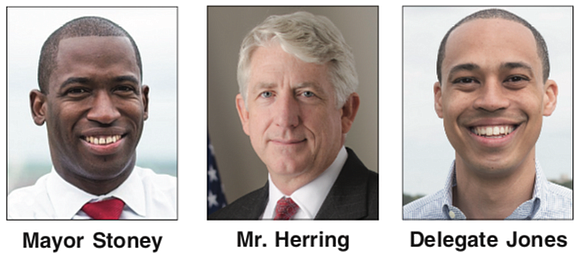State Police to probe handling of city contract to remove rebel statues
Jeremy M. Lazarus | 1/21/2021, 6 p.m.
Did Mayor Levar M. Stoney violate the state’s procurement law when his administration provided a sole-source emergency contract worth $1.8 million to remove city-owned Confederate statues?
After two months, Attorney General Mark R. Herring has given a special prosecutor the green light to have State Police investigate the transaction to determine if there was any criminal wrongdoing.
The special prosecutor, Augusta County Commonwealth’s Attorney Tim Martin, made the request in November after deciding a probe was warranted of the mayor’s award of the contract. How long the probe will take and whether it will turn up anything is unknown.
The issue is the level of authority that Mayor Stoney had to bypass state procurement law and give the contract to Devon Henry, an African-American contractor from Newport News who, it later turned out, had made a combined $4,000 contribution to the mayor’s 2016 campaign and his One Richmond political action committee.
Mayor Stoney has said the action to remove the Confederate statues, taken amid the continuing demonstrations over racial injustice and police brutality, was designed to quiet the uproar and protect public safety.
The mayor has said he left the selection of the contractor to Robert Steidel, the city’s chief of operations. Mr. Steidel has said the mayor had no involvement choosing the contractor to do the statue removal work or in setting the contract terms; the mayor signed the contract award.
Among the concerns has been the price tag for the removal. Three other contractors have said privately that $1.8 million is five to six times the amount that was needed. Insisting on anonymity, those contractors have suggested that $200,000 to $300,000 was the most that should have been spent, and each said that still would have yielded a substantial profit.
According to Mayor Stoney and his defenders, the price tag soared because no other contractors in the area were willing to do the work. Mr. Steidel has confirmed he struggled to find a company for the removal.
The removal of the Confederate statues capped more than a month of daily protests in Richmond triggered by the police killing of George Floyd in Minneapolis during the Memorial Day holiday. A viral video of the officer suffocating Mr. Floyd by kneeling on his neck triggered sometimes violent clashes in cities across the country, including Richmond. Here, protesters rampaged during the first few days. They burned a city bus and at least four stores and broke storefront windows of numerous Downtown businesses, many of which were boarded up for months. Peaceful protests turned violent as police fired tear gas and rubber bullets to disperse crowds.
Gov. Ralph S. Northam declared a state of emergency in early June after the initial protests in Richmond and later extended it into the first week of July. That declaration granted Mayor Stoney sweeping authority to deal with the situation as the city’s director of emergency operations.
On June 8, Richmond City Council endorsed Mayor Stoney’s own declaration of emergency, triggering a state law that grants the director of emergency operations near dictatorial powers and temporarily suspends state laws that might hold up action to deal with the emergency.
That section of the state code, 44-146.21, allows the director in dealing with an emergency to, among other things, “enter into contracts and incur obligations necessary to combat such threatened or actual disaster, protect the health and safety of persons and property ... without regard to time-consuming procedures and formalities prescribed by law pertaining to the performance of public work, entering into contracts, incurring of obligations, employment of temporary workers, rental of equipment, purchase of supplies and materials and other expenditures of public funds.”
Mr. Herring’s decision to approve Mr. Martin’s request to launch a State Police probe has drawn fire from Norfolk Delegate Jay Jones, who is challenging the incumbent attorney general in the June Democratic primary.
Delegate Jones claimed that the State Police investigation was approved only after Mayor Stoney endorsed him in the attorney general contest, and he charged that this was further evidence that Mr. Herring is using his office for political purposes.
The delegate noted that Mr. Herring earlier had authorized a State Police investigation of another supporter, state Sen. Joseph D. “Joe” Morrissey of Richmond. The special prosecutor in that case, New Kent Commonweal’s Attorney, T. Scott Renick, used a State Police probe to bring misdemeanor charges against Sen. Morrissey for allegedly engaging in illegal electioneering at a polling place in 2019. But the charges were dismissed Jan. 8, with Mr. Renick’s assistant, who handled the case in court, acknowledging there was no evidence to support the charges.
In response to a Free Press query, Charlotte Gomer, spokeswoman for Mr. Herring, stated: “The Office of Attorney General did not initiate this investigation (of Mayor Stoney), is not conducting it, has no oversight over it and has no say in the outcome.”
Ms. Gomer noted that Mr. Herring’s of- fice did not announce that it had authorized Mr. Martin to use the State Police. State law requires the attorney general or a special grand jury to provide such authorization when an elected official is involved. She said that information about the probe came from Mr. Martin.







